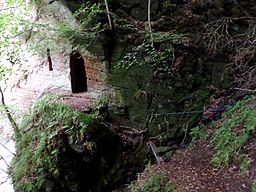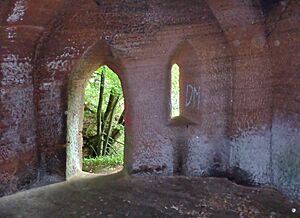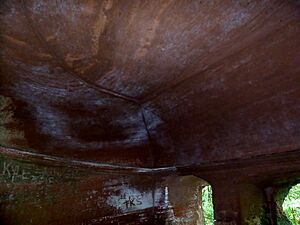Wallace's Cave, Auchinleck facts for kids
Quick facts for kids Wallace's Cave |
|
|---|---|
| Wallace's Grotto | |

The cave entrance and window
|
|
| Location | Auchinleck, East Ayrshire |
| OS grid | NS498233 |
| Length | 12 feet (3.7 m) |
| Elevation | 40 feet (12 m) |
| Entrances | 1 |
| Difficulty | Caution required |
| Hazards | Access to site |
| Access | By a rough path & steps |
Wallace's Cave is a fascinating old grotto found in the Lugar Gorge near Auchinleck in East Ayrshire, Scotland. It was built in the 1700s, around the same time as another interesting building called Dr Johnson's Summerhouse, both located on the Auchinleck Estate. This cave shows amazing craftsmanship and might even be an older, natural cave that was made bigger. It's located downstream from where the Dippol Burn meets the River Lugar. Getting to the cave can be a bit tricky now because the path along the cliff edge is rough, and there's a steep drop to the river below.
Contents
Exploring Wallace's Cave
Wallace's Cave is a special building, listed as Category B, which means it's important for its history. You reach it by following a narrow path and some steps carved into the rock along the River Lugar gorge. The cave is actually inside a smaller gorge, so you need to cross a small stream to get to it.
Inside the cave, you can clearly see the marks left by the masons' chisels. They shaped the rock to create a room about 14 square feet in size. The roof has cool, arched ribs that meet in the middle, making it look a bit like a cross. The cave is about ten feet tall. You enter through a pointed archway, about seven feet high, which used to have a door. There's also a small, similarly shaped window to the left as you look from outside, but it doesn't seem like it ever had glass.
People have wondered about the cave's age. Some think it might be much older, perhaps from the late 1200s or 1300s. However, old maps don't always show it. For example, a map from 1832 doesn't mark the cave, but by 1896, it starts appearing on maps.
Other Caves Named Wallace's Cave
It's interesting to know that there are other places in Scotland also called Wallace's Cave! These caves are often linked to the famous Scottish hero, William Wallace.
- One such cave is near Hawthornden Castle in Roslin Glen, Midlothian. William Wallace was involved in a battle nearby in 1303.
- Another Wallace's Cave was found in Bothwell Parish, Lanarkshire, close to the old Ravenscraig Steelworks.
- Crawhill in Lothian also has a Wallace's Cave, said to be where Wallace hid after the Battle of Falkirk.
- Near New Lanark, on the River Clyde at Corra Linn, there's another example.
- It's said that William Wallace used a cave on the opposite side of the River Ayr from Wallace's Heel Well to hide from English soldiers, but no trace of it remains today.
- A natural cave in the Cartland Craigs ravine in South Lanarkshire is also locally believed to have been a refuge for Wallace.
- Another traditional Wallace's Cave is located near Lugar in the Cubs' Glen on the Glenmuir Water.
The Cave's Story
Experts believe Wallace's Cave was created around 1760. It was carved out of soft red sandstone in a Gothic style. It was likely built as a "folly" or "grotto," which were decorative buildings popular in large estates during that time. However, it's possible it was an existing natural cave that was simply made bigger.
Sometimes, during times of war or trouble, people would hide important things like valuable items or documents in safe places. It's thought that Wallace's Cave might have been used for this purpose originally, similar to Bruce's Cave at Kirkpatrick Fleming.
The first owner of Auchinleck, Nicol de Achethlec, was a strong supporter of Scottish independence. He was even said to be related to William Wallace. Nicol rode with Wallace to Glasgow where they defeated English soldiers in a battle. It's believed that the grotto was named Wallace's Cave to honor this connection between the Boswell family (who owned Auchinleck Estate) and the national hero. It was likely built around 1760, at the same time as Dr Johnson's Summerhouse, to make the new Auchinleck House and its gardens even more beautiful.
A Visitor's Memory
Around 1947, a visitor described walking to one of the caves on the estate. They found "a staircase of broad wooden steps built into the steep bank, but so deep in leaves that the stepping places were hard to distinguish." This led down to the water's edge and into "a large cave hewn in the solid rock. A fine dry apartment it was, and to sit on the carved ledge and watch the wagtails dipping from stone to stone, the burn clear as a sheet of crystal, was most restful." This description might be about the summerhouse named after Samuel Johnson.



